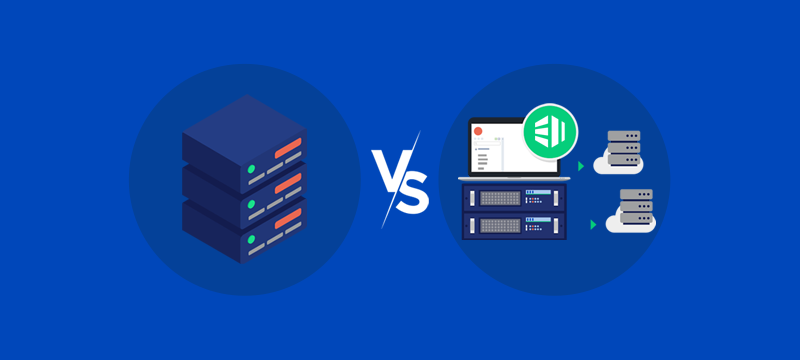As companies edge closer to digital transformation, they are constantly looking for the most effective, secure and efficient places to run their apps and store the increasing amount of data that they collect and process. Two of the most common IT solutions are dedicated and virtual servers. Here we look at the advantages and disadvantages of both for business use.
The difference between dedicated and virtual servers
The key difference is that a dedicated server is a large, powerful physical machine, while a virtual server, although it uses physical hardware, is independent of it. Both dedicated and virtual servers are used solely by a single customer. However, a physical server can house multiple virtual servers for multiple customers.
Understanding costs
Dedicated servers can be purchased for use in-house or hosted remotely by a web host. Purchasing them is expensive and requires companies to acquire additional infrastructure, including cooling and network equipment. They will also need in-house expertise to manage and maintain them. This is why hosting them remotely has become a more popular way to procure a dedicated server. With a hosted dedicated server, there is no capital expenditure as the server is leased, no need to pay for additional infrastructure and no need to manage or maintain the server as these come with the managed hosting solution.
From a cost perspective, virtual servers are certainly cheaper, as they generally need less hardware and use less energy. Again, when hosted, there is no need to pay for power, cooling and server maintenance.
Scalability
Dedicated servers are big computers with large storage and generous CPU and RAM. At eukhost, for example, they can offer 2TB of SSD storage, 32 core Intel Xeon 4216 CPUs and 64GB DDR4 (max 256GB). For many businesses, these machines come with scalability built-in, as they can offer more resources than a company will use on a day-to-day basis. However, that extra capacity will need to be paid for every month. What’s more, if additional resources are required above and beyond the capacity of the dedicated server, then an additional server will be needed, and the time required to set up and deploy it could be too slow for urgent use.
Virtual servers, on the other hand, can be deployed in minutes, making scalability far easier to achieve. What’s more, this enables companies to have smaller virtual servers for day-to-day use, so that monthly costs are kept more affordable.
Performance versus availability
In most cases, both dedicated and virtual servers offer exceptional performance and are highly reliable. However, there are some important differences that you should be aware of. When performance is of the utmost importance, the great thing about dedicated servers is that you can build your own specification to suit your own needs. You can even do this with hosted dedicated servers, not just the ones you buy. So, in this respect, it is possible to build a dedicated server that performs better than the ones which power virtual servers.
When it comes to availability, however, virtual servers have the advantage. As they are independent of the physical machine, it means that if there is a hardware failure, they can simply be moved to another machine and continue running. Today’s advanced system monitoring enables web hosts to spot server issues early, allowing virtual servers to be moved before failure occurs.
What this means, therefore, is that process heavy workloads may be better suited to dedicated servers, while critical apps that need constant uptime would be better with a virtual server.
Security
Again, both virtual and dedicated servers offer secure ways to store data, especially when protected by the arsenal of security tools used by today’s web hosts. However, when it comes to compliance, some companies, especially those that collect sensitive data, prefer to use a dedicated server because the hardware is not shared. With virtual servers, the hardware is shared as several virtual servers can be run on one physical machine. For this reason, many companies consider the single tenancy dedicated server as more secure than a virtual server.
Conclusion
As you can see, there are some significant differences between dedicated and virtual servers. Dedicated servers are more powerful and secure, but are expensive, especially when purchased and not hosted. Virtual servers offer greater scalability and availability and are much more affordable. Of course, businesses can combine both dedicated and virtual servers as part of a hybrid solution that caters for the different needs that a business has.
For more information, visit our Dedicated Servers and VPS Hosting pages.



